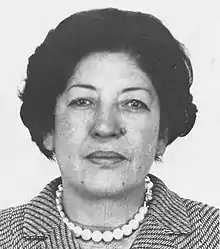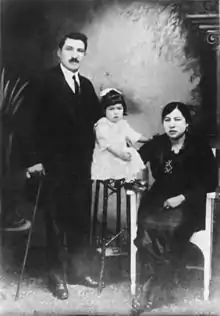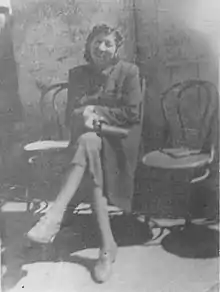Elsa Cladera de Bravo
Elsa Cladera de Bravo (María Rosaura Elsa Cladera Encinas de Bravo [ma'ria ro'sauwra 'elsa kla'dera en'sinas de 'braßo] Spanish pronunciation). (1922–2005) was a Bolivian trade union leader and educator,[1][2][3][4] leader of the teachers organisation in Bolivia, delegate at the "Asamblea del Pueblo" in 1971, engaged in the work for women's emancipation[5][6][7][8]
Elsa Cladera de Bravo | |
|---|---|
 Elsa Cladera de Bravo, in November 1964. (Photo: Elsa Cladera de Bravo Archives (ECBA)) | |
| Born | February 3, 1922 |
| Died | June 27, 2005 (aged 83) |
| Resting place | “Cementerio General” in La Paz, Bolivia |
| Occupation | Meritorious Teacher, Trade Union Leader |
| Known for | Representations: Delegate at the “Asamblea del Pueblo” in 1971. Leader of the teachers organization in Bolivia (1964–1971). Member of the leadership of the “Alianza de Liberación de la Mujer Americana” (ALMA). One of the founders of the “Unión de Mujeres de Bolivia” (UMBO). Representative of UMBO at the Women's World Conference 1972. |
| Spouse(s) | Fernando Bravo James |
| Children | Elsa Nadezhda, Emma Bolshia, María Alexandra |
Biography
Social and political awareness
Both of Elsa Cladera Encinas’ parents belonged to well known families in Oruro. Her father, Carlos Cladera Zelada was a lawyer, mayor of Oruro and member of the Supreme Court. He was among the pioneers who were in favor of the nationalization of the Standard Oil Company. Elsa's grandfather, Froilán Cladera Cabanero, was the founder of the Faculty of Law at the Universidad Técnica de Oruro and the first vice-chancellor there.[9][10] When young, Elsa had worked as her father's assistant at the tribunal. Elsa's mother, Florinda Encinas San Martín, was from a wealthy family in Oruro. Both her mother and her great aunt, Dorotea Encinas, provided advice and financial help to people who were in need. Therefore, Elsa learned the importance of sharing with others from her mother and her great aunt. The seeds of Elsa's social awareness were sown both by the quest for justice on the part of her father and by the generosity of her mother.[11]

The working and living conditions of the miners in Oruro around 1942-1952 were a further factor in raising Elsa's political and social consciousness. During this time Elsa had watched the miners’ demonstrations as they came down from the mines around Oruro voicing their demands for social justice. Elsa attended left groups with other young people where they discussed workers’ power, social and political justice.[12] She was then able to fully appreciate the nature of the demands of the miners.[13]

A third factor that consolidated her social and political awareness was her meeting with Fernando Bravo James (Potosí 1912-La Paz 1962). He was a politician, a Trotskyite, a revolutionary,[14][15] a university lecturer at the Universidad Técnica de Oruro and the Universidad Mayor de San Andrés[16] as well as a teacher. The first time Elsa caught sight of Fernando was when he was leading a demonstration protesting the massacre of miners in Catavi (1942).[17][18][19][20] It was love at first sight and they eventually married in 1943 and later they had three daughters.
_002.jpg.webp)
Women's participation
Elsa affirmed that effective women's participation in national and international development would only come about through social struggle and that without such participation on the part of women it would in reality be impossible to reach genuine national independence.[21]
She belonged to two women's organizations “Alianza de Liberación de la Mujer Americana” (ALMA)[22] and “Unión de Mujeres de Bolivia” (UMBO).[23] She was a member of the leadership of ALMA in 1960. She was also among the founders of UMBO and delegate of UMBO to the “Seminario Mundial de la Mujer” (Women's World's Conference) that was held in Chile in 1972.
The policies of ALMA included propagating for women's emancipation and equal political rights, the defense of universal suffrage and the demand for equal pay for equal work.[24]
UMBO is a national organization of an anti-imperialistic and anti-feudal nature through involvement in the struggle for peoples’ liberation, for their right to self determination, against foreign intervention in internal affairs, for respect for human rights, for promoting rights and opportunities for women equal to those of men in the administration and affairs of state.[25]
Trade union leader
Testimony of Elsa's solidarity with the working class is evident from her energetic, authoritative and crucial work. Her efforts to create a durable relationship between the teacher's trade union and the central umbrella unions for all workers in Bolivia: Central Obrera Departamental (COD) of La Paz and Central Obrera Boliviana (COB) which have been of such immense importance to Bolivia.[26][27]
She was not only respected as a trade union leader but also genuinely loved by the people as one of her colleagues said. As a trade unionist leader she proposed radical measures, for example, better economic conditions for teachers, workers’ power, weapons for the working class under President Juan José Torres government (1970-1971) and this posture so enthralled a colleague from Venezuela that she was given the name “Maestra de profesión y revolución”.
The following are some of the posts she held as a trade union leader:
- In July 1964 she was “Secretaria de Vinculación Sindical de la Federación de Maestros urbanos de La Paz”.[28]
- In November the same year she was “Secretaria Ejecutiva de la Federación de Maestros Urbanos de Bolivia”.[29]
- In 1967 she was COD's “Secretaria de Relaciones”. In this period her work consisted of reorganizing the trade unions that were outlawed under René Barrientos (1964-1969).[30]
- In 1969 she was COBs delegate to the Seminar of Latin American Trade Unionists in Santiago de Chile. This seminar was organized by “Central Única de Trabajadores de Chile” (CUT) and Universidad de Chile. She was the only women among all the delegates from Argentina, Brasil, Colombia, Chile, Ecuador, Perú, Venezuela and Costa Rica.[31]
- In 1970 she was COBs delegate to the first Pedagogy Congress for teachers in Bolivia.
- In 1971 she was CODs delegate at “Asamblea del Pueblo”.[32][33]
Since 1979 she has been named one of the “Maestros meritorios” (Meritorious’ Teachers) in Bolivia.[34]
Representative at the ”Asamblea del Pueblo” (Peoples’ Assembly) 1971
Recognized by the workers of the trade unions as a combatant trade unionist, she was appointed as COD’S delegate to the “Asamblea del pueblo” in 1971. She was one of the five women among the two hundred and eleven delegates.[35][36][37]
Exile
After Banzer’s military coup in Bolivia (1971), Elsa was forced into exile, first in Chile [38] and then later in Switzerland following Pinochet’s military coup against President Salvador Allende in Chile (1973).[39] During the long period that she was forced to live outside Bolivia, she never flagged in her outspoken condemnation of the abuses in Bolivia and other Latin American countries.
In 1975 she was invited to Turin, Italy[40] to participate in a conference [41] during the solidarity week together with members of the Bolivian resistance. During her visits to Stockholm, Sweden (1973-1993) she regularly met with refugees from Bolivia living in many different towns and cities. She founded branch organizations of UMBO in Gothenburg and Uppsala.[42] During a national women’s strike in Switzerland in 1991, she was invited to talk at that event. During that day a street in Fribourg was named after her, “Elsa Cladera de Bravo Strasse”.[43][44] The experiences of struggle that brought about involuntary exile are clearly important testimonies to her life (1973-2005).,[45][46][47]
References
- Cladera, Nadezhda Bravo (2013). Libris. ISBN 9789995483029. Retrieved 5 April 2016.
- Bibliothèque de Documentation Internationale Contemporaine. "Elsa Cladera de Bravo. Maestra de profesión y revolución". Retrieved 5 March 2020.
- "Publican biografía de una dirigente del magisterio". Archived from the original on 4 March 2016. Retrieved 14 August 2020.
- "La escuela latinoamericana Elsa Cladera de Bravo en Friburgo". Retrieved 20 April 2014.
- "Biografie einer Frauenrechtlerin, die von Bolivien über Chile nach Freiburg flüchtete".
- Oporto Ordoñez, Luis, "Elsa Cladera, maestra de profesión y revolución", Página Siete, La Paz, 17 March 2013.
- "Fuentes" (PDF). Retrieved 15 January 2017.
- "Lehrerin, Gewerkschaflerin 1922". Archived from the original on 10 September 2014. Retrieved 22 April 2014.
- "Alma Mater de la ilustración de Oruro". Retrieved 14 October 2012.
- "Renuevan compromiso con Facultad de Derecho en sus 121 años". Retrieved 20 April 2014.
- Bravo Cladera, N. (2013) Elsa Cladera de Bravo. Maestra de profesión y revolución. La Paz Correveidile, pp. 27-29.
- Internationella Biblioteket. "Med törst för rättvisa". Retrieved 7 August 2020.
- Jonh, S. Sándor (2009) Bolivia's Radical Tradition: Permanent Revolution in the Andes. The University of Arizona Press, p. 92.
- John, S. Sándor (2009), p. 77
- Dunkerley, James (1987) Rebelión en las venas. La Paz, Plural, p. 41
- Barrón Feraudi, Jorge (1963) Esbozo Monográfico de la Facultad de, Economía. 1938- Año de las Bodas de Plata - 1963. Universidad Técnica de Oruro, p.92.
- Dunkerley, James (1987), p.38;
- John, S. Sándor (2009), p.166
- Klein, Herbert S.(1971) "Prelude to the revolution". In James Malloy and Pichard Thom (eds.) Beyond the Revolution. Bolivia since 1952, Pittsburg University of Pittsburgh Press, pp. 25-52.
- Ostria, Gustavo Rodríguez (6 August 2014). Capitalismo, modernización y resistencia popular 1825-1952. ISBN 9789995481698. Retrieved 15 October 2017.
- "Kalender 2007 Wegbereiterinnen V". Retrieved 21 April 2014.
- Bravo Cladera (2013), p. 88.
- John, S. Sándor (2009), p. 311
- "Bases y fines para la organización femenina", La Paz, July 1958, Archive Elsa Cladera de Bravo (AECB).
- "Estatutos de Unión de Mujeres de Bolivia", La Paz, circa 1952, Archive Elsa Cladera de Bravo (AECB).
- "Elsa Cladera de Bravo y la lucha sindical". Retrieved 8 March 2014.
- "Lehrerin, Gewerkschaflerin 1922". Archived from the original on 10 September 2014. Retrieved 22 April 2014.
- "Taped conversation with Elsa cladera de Bravo, Name of the tape: ECBTCG4, Fribourg, 1980, Archive Elsa Cladera de Bravo (AECB).
- "Maestros eligieron nuevos dirigentes" Tribuna Universitaria, La Paz, 18 November 1964.
- Cladera de Bravo, Elsa, "Palabras de Elsa de Bravo, Secretaria de Relaciones de la Central Obrera Departamental ante el Tercer Congreso",La Paz, July 27, 1968, Archive Elsa Cladera de Bravo (AECB).
- Central Única de Trabajadores de Chile (CUT): "Convenio CUT- Universidad de Chile, Escuela Sindical. Certificado de Asistencia", Santiago de chile, 31 May 1969 Archive Elsa Cladera de Bravo (AECB).
- " Federación Nacional de Maestros Urbanos de Bolivia. VIIIo Congreso Nacional Ordinario de Maestros Urbanos de Bolivia. Informe de la primera comisión revisora del informe del Comité Central de la Federación Nacional de Maestros urbanos de Bolivia", El Diario, La Paz, 18 May 1971;
- "La mujer estuvo presente en la Asamblea del Pueblo", Rebelión, La Paz, June–July 1971.
- "Galería de Maestros meritorios", ABC,La Paz, 10 October 1979.
- Bravo Cladera, N.(2013), p. 121;
- "Federación Nacional de Maestros Urbanos de Bolivia. VIIIo Congreso Nacional Ordinario de Maestros Urbanos de Bolivia. Informe de la primera comisión revisora del informe del Comité Central de la Federación Nacional de Maestros urbanos de Bolivia", El Diario, La Paz, 18 May 1971;
- "La mujer estuvo presente en la Asamblea del Pueblo", Rebelión, La Paz, June–July 1971.
- "Letter from Elsa cladera de Bravo", Santiago de Chile, 10 January 1972, Archive Elsa Cladera de Bravo (AECB).
- "Letter from Elsa Cladera de Bravo", Altstätten, 5 November 1973 Archive Elsa Cladera de Bravo (AECB).
- "Letter from Elsa Cladera de Bravo", Turin, 9 October 1975, Archive Elsa Cladera de Bravo (AECB)
- Cladera de Bravo, Elsa, "Situación de Bolivia", Turin, October 1975, Archive Elsa Cladera de Bravo (AECB)
- "Letter from Elsa Cladera de Bravo", Fribourg, May 1978, Archive Elsa Cladera de Bravo (AECB).
- Bravo Cladera, N. (2013), pp. 180, 181;
- Cladera de Bravo, Elsa "Discurso de Elsa Cladera de Bravo en la Huelga Femenina en Suiza", Fribourg, 14 June 1991, Archive Elsa Cladera de Bravo (AECB).
- Favarger, Alain, "L'exile suisse d'une sindicaliste bolivienne", La Liberté, Fribourg, 4–5 December 1982.
- Koller, Marco, "Biografie einer Frauenrechtlerin, die von Bolivien über Chile nach Freiburg flüchtete", Freiburger Nachrichten, Fribourg, 2 November 2015.
- "Presentación del libro Elsa Cladera de Bravo. Maestra de profesión y revolución, en Suiza". Retrieved 14 August 2016.
Sources
- Archive Elsa Cladera de Bravo (AECB)
- Barrón Feraudi, Jorge (1963) Esbozo Monográfico de la Facultad de Economía. 1938 - Año de las Bodas de Plata - 1963. Universidad Técnica de Oruro
- Bravo Cladera, Nadezhda (2013) Elsa Cladera de Bravo. Maestra de profesión y revolución. La Paz, Correveidile. ISBN 978-99954-830-29 [1][2]
- Dunkerley, James (1987) Rebelión en las venas. La Paz, Plural. ISBN 99905-75-19-3.
- John, S. Sándor (2009) Bolivia's Radical Tradition. Permanent Revolution in the Andes. The University of Arizona Press. ISBN 978-0-8165-2764-9.
Newspapers
- ABC, La Paz, June -July 1979
- El Diario, La Paz, May 1971
- Freiburger Nachrichten, Fribourg, November 2015
- La Liberté, Fribourg, December 1982
- La Prensa, La Paz, March 2013
- Rebelión, La Paz, June–July 1971
- Página Siete, La Paz, March 2013
- Tribuna Universitaria, La Paz, November 1964
External links
- Cladera, Nadezhda Bravo (2013). Libris. ISBN 9789995483029. Retrieved 4 August 2020.
- "Presentación del libro Elsa Cladera de Bravo. Maestra de profesión y revolución, de Elsa nadezhda Bravo Cladera (21/03/2013)". Fuentes, Revista de la Biblioteca y Archivo Histórico de la Asamblea Nacional. La Paz, Bolivia.
- "Biografie einer Frauenrechtlerin, die von Bolivien über Chile nach Freiburg flüchtete". Freiburger Nachrichten.
- "Vida y obra de Elsa Cladera de Bravo". Letras bolivianas, online. Elsa Cladera de Bravo's life and work.
- "Elsa Cladera de Bravo:maestra de profesión y revolución". Stanford University Libraries.
- "Presentación del libro 'Elsa Cladera de Bravo. Maestra de profesión y revolución' en Suiza". ae allevents.in Friburgo.
- "Lehrerin, Gewerkschaflerin 1922". Retrieved 22 April 2014.
- "Publican biografía de una dirigente sindical". Archived from the original on 10 September 2014. Retrieved 14 August 2020.
- "Publican biografía de una dirigente del magisterio". Archived from the original on 4 March 2016. Retrieved 14 August 2016.
- "Elsa Cladera de Bravo. Maestra de profesión y revolución" (PDF). Retrieved 15 January 2017.